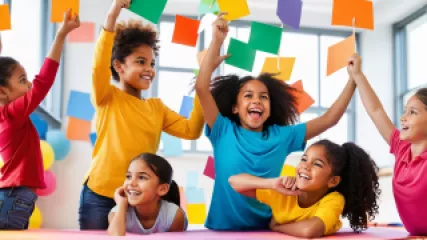Effective Strategies for Boosting Kids' Psychological Resilience
Introduction
Building resilience in children is a crucial aspect of their overall development. It equips them with the ability to navigate life's challenges, bounce back from setbacks, and thrive in the face of adversity. The journey towards developing mental toughness for children begins with empowering them to cultivate psychological resilience. In this research summary, we will explore effective strategies for boosting kids' psychological resilience and inspiring them to become resilient individuals.
1. Encouraging Positive Self-Talk
One powerful way to nurture resilience in children is by encouraging positive self-talk. Teaching kids to replace negative thoughts with affirming and empowering statements can help them develop a more optimistic outlook on life. By fostering self-compassion and self-belief, children can build a strong foundation for resilience.
2. Cultivating a Growth Mindset
Developing a growth mindset is essential for building resilience in children. By instilling the belief that effort, learning, and perseverance lead to growth and success, kids are encouraged to embrace challenges and view setbacks as opportunities for growth. This mindset shift enables them to develop resilience and overcome obstacles with determination.
3. Promoting Emotional Intelligence
Emotional intelligence plays a vital role in building resilience. Helping children recognize, understand, and manage their emotions equips them with the tools to cope effectively with adversity. By teaching kids strategies for regulating their emotions and expressing themselves constructively, we empower them to navigate difficult situations with resilience and empathy.
4. Fostering Supportive Relationships
Strong and supportive relationships have a profound impact on children's resilience. By cultivating connections with family, friends, and mentors, kids have a network of support to rely on during challenging times. These relationships provide a sense of belonging, encouragement, and guidance, reinforcing children's resilience and helping them face adversity more effectively.
5. Teaching Problem-Solving Skills
Equipping children with effective problem-solving skills enhances their ability to navigate obstacles and setbacks. By teaching them how to identify problems, brainstorm solutions, evaluate options, and take action, we empower kids to approach challenges with a proactive mindset. This fosters resilience by enabling them to find innovative solutions and adapt to changing circumstances.
6. Building a Sense of Purpose
A sense of purpose gives children a reason to overcome adversity and stay resilient. Encouraging kids to explore their passions, set goals, and engage in activities that align with their values helps them develop a strong sense of purpose. When faced with difficulties, children with a clear sense of purpose are more likely to persevere and find meaning in their experiences.
7. Nurturing Self-Care Practices
Self-care is an essential component of building resilience in children. Teaching kids the importance of taking care of their physical, emotional, and mental well-being equips them with the tools to recharge and cope with stress. By encouraging activities such as exercise, mindfulness, and hobbies, we empower children to prioritize self-care and enhance their resilience.
8. Emphasizing Resilience as a Process
It is crucial to emphasize to children that resilience is not a one-time achievement but an ongoing process. By framing resilience as a journey rather than a destination, kids understand that setbacks and failures are natural parts of life. This perspective encourages them to view challenges as opportunities for growth and resilience-building.
9. Modeling Resilient Behavior
As adults, we have a significant influence on children's development. Modeling resilient behavior and demonstrating healthy coping strategies can inspire kids to develop their own resilience. By openly discussing our own challenges, setbacks, and how we navigate them, we provide children with real-life examples of resilience in action.
10. Celebrating Effort and Resilience
Recognizing and celebrating children's efforts and resilience reinforces their belief in their own abilities. Acknowledging their achievements, progress, and perseverance boosts their self-confidence and motivates them to continue developing their resilience. By creating a culture that values and celebrates resilience, we empower kids to embrace challenges and develop their full potential.
Conclusion
Empowering resilient kids is a transformative journey that requires intentional effort and support. By implementing these effective strategies for boosting kids' psychological resilience, we can inspire children to face life's challenges with courage, adaptability, and a growth mindset. Building resilience in children not only equips them with the tools to thrive but also lays the foundation for a future generation of mentally strong and empowered individuals.






